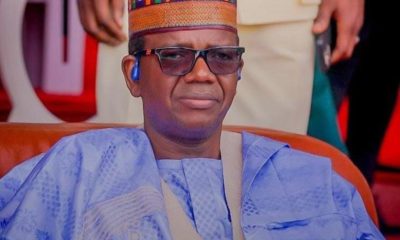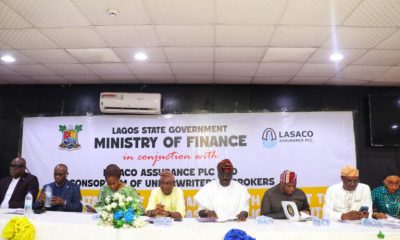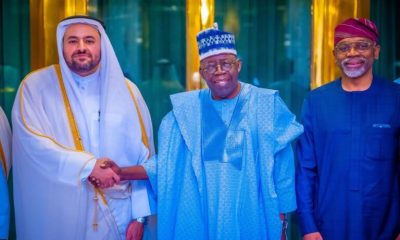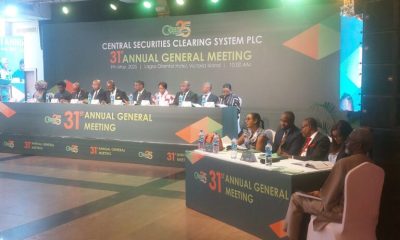OPINION
Why Burkina Faso, Mali and Niger Exit from ECOWAS is no BREXIT

By Olu Jacobs
Comparisons are being made between the sudden exit of the military juntas of
Burkina Faso, Mali and Niger from the Economic Community of West African
States, ECOWAS, and Britain’s 31 st January 2020 official exit of Britain from the
European Union.
On the surface, similarities can be found with Brexit, to wit: some small nation
with a fraction of the GDP of the entire group leaves a Community of equals and
forfeits all the advantages of the economies of scale inherent in a single market
where there is unhindered intra-Community movement of goods and services,
unencumbered by law or tariffs.
As the pretext for leaving, the errant countries accused the Union of promoting
unpleasant polices, policies which were in fact part of the fundamentally practices
of the body and core mandate of the group, and entrenched in its rules of
procedure and which has sustained the Union throughout the 40 or so odd years
of its existence
As a consequence of leaving a group which exerts stronger bargaining power as a
block, the decampees runs the risk of losing out on the group’s negotiating
power and may no longer enjoy free trade with the rest Member
States
But here the comparison ends. The UK at least held a
referendum where its people voted to leave the EU. The trio of
Capt. Ibrahim Traoré, Col. Assimi Goita, and Brig. Gen. Abdourahamane Tiani,
did not bother with such niceties. Having come to power through the force of
arms, they were under no obligation to inform their people, much less seek their
views, before the pompous announcement penultimate weekend that, “taking all
their responsibilities in the face of history and responding to the expectations,
concerns, and aspirations of their populations, decide in complete sovereignty on
the immediate withdrawal of Burkina Faso, Mali, and Niger from the Economic
Community of West African States.”
Moreover, Britain was not buffeted by terrorists on the verge of overrunning the
country when it left the EU, nor did it need any help with its security
architecture. On the contrary, it was the most powerful military force in the
union at the time with a strong economy. Still, leaving the EU against popular
expectations shook the global markets and caused the British pound to fall to
its lowest level against the dollar in 30 years. The following day, Prime
Minister David Cameron resigned, and economists suggest that Brexit may
have irreversibly harmed the British economy despite its development level
and reduced its real per capita income, in the long term.
One can therefore imagine the implication for Burkina Faso, Mali and Niger
which together belonged to the ten poorest countries in the world, abandoning
the $702bn economy that ECOWAS represents. These three are not only
landlocked nations bedeviled by the twin plagues of recurring drought and
terrorism, they are moreover hounded by sanctions, substantial populations of
internally displaced persons who are near famine and a losing battle with ISIS-
Sahel and other violent groups.
Burkina Faso for instance is ranked the fourth worst terrorist plagued nation in the
world after Afghanistan, Iraq, and Somalia. It had 597 violent attacks across 10 of its
13 regions in 2022 leading to thousands of deaths and an estimated 1.6 million of its
population internally displaced. Mali‘s 4500 miles of porous borders with seven
neighboring countries has seen similar armed attacks, abductions, car jackings, IEDs,
vehicle-borne IEDs, rocket attacks, targeted assassinations, and armed imposed
blockades and ambushes. With their security services overwhelmed, they can hardly
cope as ISIS-Sahel, formerly known as ISIS-GS, and the al-Qa’ida-affiliated JNIM
operate indiscriminately.
A recent report ( Pls attribute) described this part of the Sahel as “the epicenter of
terrorism globally accounting for 43 percent of terrorism deaths in 2022, more than
South Asia, the Middle East and North Africa combined.”
These are compounded by pervasive poverty, battles over decreasing resources,
mass displacement of people as a result of climate change and refugee problems
caused by ubiquitous violence which have collectively transformed the area into the
epicentre of terrorism . Yet although General Tiani said the reason for his coup was
to check the scourge of terror, the truth was that by 2022, his Niger, which the year
before had the largest increase in terrorism deaths had already turned a corner.
President Bazoum was winning the war on terror so much so that 90 percent of
deaths from extremist groups in the Sahel in 2022 occurred in Burkina Faso and Mali
which were, ironically led by military juntas.
The Niger coup therefore was more likely to worsen rather than reduce the scourge
of terrorism, as history has shown, which was one reason ECOWAS was set against
it and took the drastic measures to impose sanctions and invoke the protocol that
allows it to use force if necessary to dislodge an un democratic government. Another
reason, apart from the need to halt the domino effect of this putsch on neighboring
countries, was because Niger had turned into a bastion of democracy in the Sahel, a
bulwark against Russian and jihadist movement and proof of the success of western
alliance. With the coup the nation lost all aids and military assistance. The EU
foreign policy chief Josep Borrell promptly announced the “immediate
cessation of budget support” and suspension of “all cooperation actions in
the domain of security,” which translated means its allocation of EUR 500
million for improving governance, education, and sustainable growth in the
country, it’s 27 million-euro military training mission (EUMPM) in Niger in
addition to around 1,500 Barkhane troops stationed in the country, has
come to an end with “immediate cessation of budget support” and
suspension of “all cooperation actions in the domain of security.”
France which has provided the country with around EUR 120 million
in development aid in 2022 also suspended all development and budget
support, and the US which had two military drone bases and over 1,000
troops deployed in Niger, and had just announced $150 million in direct
assistance also suspended its security cooperation with Nigerien forces.
For a nation which the World Bank estimates has about 10 million of its
people, or around 40 percent of the population, emershed in extreme
poverty, the lowest Human Development Index (HDI) worldwide and
battling acute water scarcity and food insecurity and high population
growth, there is little doubt that Niger needs all the help it can get from
ECOWAS. In total, the country, like the rest two, relies on close to USD 2
billion a year in official development assistance of which ECOWAS provides
a sizable part and more importantly access to the huge regional market.
Economic sanctions led to the closure of the bustling border between Niger and
Nigeria, halting roughly $1.3 billion worth of annual trade. The United States goods
exports alone to ECOWAS in 2022 were $6.7 billion, and its imports from
ECOWAS totaled $9.4 billion in 2022, up 38.8 percent ($2.6 billion) from 2021.
This is the market that the three nations will forfeit. According to a report, Guinea’s
2008 coup and Mali’s coup had erased a combined $12 billion to $13.5 billion from
their economies over five years, which represented 76% of Guinea’s 2008 gross
domestic product and almost half of Mali’s 2012 GDP.
The real goal of ECOWAS is to promote economic cooperation among member
states in order to raise living standards and promote economic development. The
regional group has also worked hard to address security issues by developing a
peacekeeping force for conflicts in the region. The three juntas claimed they were
taking their 75m people out of the bloc because it has not helped them fight
terrorism. That is clearly not true. For instance, ECOWAS sent thousands of
soldiers to help Mali in 2013 when a jihadist onslaught almost overran it. ECOWAS
members were in fact the leading troop contributors to a UN peacekeeping mission
there until the junta sacked it last year.
Now we come to the real real reason why the three coupists announced on Sunday 28th January
that they were taking their countries out of the regional body. Clearly it is to escape the pressure
been mounted by ECOWAS to return their nations to democracy. Mali and Burkina Faso were
already set to hold elections this year as promised ECOWAS, and Niger is under pressure to
produce a short transition timeline for civil rule.
Lashed by hunger, terror and civil strife the economies of Mali, Niger and Burkina
Faso are stunted by what has been called a “multi-dimensional crisis where insecurity,
humanitarian need, rapid urbanization of the country and the drastic effects of
climate change—impacting access to food and water, which fuel intercommunal
conflict, all converge.”
The earlier they return to the embrace of ECOWAS, the better. As a matter of fact,
the West African regional body remains Africa’s most successful example of
integration and economic, political and security cooperation. People’s free movement
throughout the region, underpinned by the visa-free system and a common passport,
is one of ECOWAS’ key achievements benefitting the region’s citizens. For landlocked
countries such as Burkina Faso, Mali and Niger especially, the Customs Union
facilitates imports through the application of a single common external tariff.
For almost 50 years, ECOWAS’ rules and operating methods have shaped
governance in its Member States.
In effect, the withdrawal of these countries which together account for 15% of
ECOWAS’ population, but nearly half its surface area is some blow to the regional
body and potentially a disaster for the three landlocked countries. However, it is
important for the reputation and the overall well-being of ECOWAS that the
countries return to the fold.
At the extraordinary Session of Ministerial Mediation and Security Council meeting,
which held Thursday to discuss this and the situation in Senegal where the president
had suddenly postponed elections, ECOWAS Commission President, Alieu Touray
said, “If there is a time for ECOWAS to stay together, this is the time … There is no
challenge that ECOWAS cannot overcome.”
ECOWAS has always insisted that the modalities of their withdrawal are
irregular, that such sudden departures are impossible to implement, and do not
comply with ECOWAS’ governing treaty which stipulates one year formal notification
during which states asking to leave must respect their commitments to the bloc.
Critics say the current situation presents an opportunity for ECOWAS to review its
frameworks, policies and practices to make the organisation more consistent and
effective and responsive to the development needs of the constituent States.
While doing that, it might not be a bad idea to create conditions for the return of
the three countries to the regional bloc either.
OPINION
GTBank, VeryDarkMan, and the EFCC: A Dangerous Precedent for Free Speech in Nigeria

By Jeff Okoroafor
In recent weeks, the arrest of social media activist Martins Vincent Otse, popularly known as VeryDarkMan (VDM), by the Economic and Financial Crimes Commission (EFCC) has sparked outrage and reignited debates about the Nigerian government’s misuse of law enforcement agencies to suppress dissent.
The circumstances surrounding his detention—reportedly linked to his criticisms of Guaranty Trust Bank (GTBank) and its influential customers—raise serious concerns about the weaponization of financial and anti-corruption institutions to silence critics. VeryDarkMan, known for his unfiltered commentary on social and political issues, has built a reputation for exposing alleged corruption, fraud, and misconduct among Nigeria’s elite. His recent posts questioning GTBank’s dealings with high-profile individuals appear to have triggered his arrest. While the EFCC claims his detention is related to “cyberstalking” and “defamation,” many see it as a politically motivated move to punish him for speaking truth to power.This is not the first time a vocal critic has been targeted under dubious charges. The EFCC, originally established to combat financial crimes, has increasingly been accused of being weaponized by the government and powerful interests to intimidate activists, journalists, and opposition figures. The agency’s swift action against VDM—while turning a blind eye to far more severe cases of fraud involving politically connected individuals—exposes its selective enforcement of the law.GTBank, one of Nigeria’s most prominent financial institutions, has denied involvement in VDM’s arrest. However, given the bank’s history of litigation against critics and its connections to influential figures, skepticism remains. If GTBank or any of its high-net-worth customers pressured authorities to detain VDM for his online commentary, it would represent a dangerous collusion between corporate power and state repression.Banks should not operate as instruments of censorship. If citizens cannot question financial institutions without fear of arrest, Nigeria’s already fragile democracy suffers further erosion. The right to criticize corporations—especially those handling public funds—is fundamental to accountability.The EFCC was once hailed as a crucial anti-graft agency, but under successive governments, it has devolved into a tool for political vendettas. From the arrest of journalists like Agba Jalingo to the harassment of activists like Omoyele Sowore, the pattern is clear: the EFCC is increasingly deployed to stifle free speech under the guise of fighting cybercrime.Section 24 of Nigeria’s Cybercrime Act, often cited in such cases, is dangerously vague and prone to abuse. It criminalizes “offensive” or “annoying” messages, giving authorities broad discretion to punish dissent. This law, alongside the EFCC’s growing politicization, creates a chilling effect where citizens self-censor to avoid persecution.The arrest of VeryDarkMan is not just about one individual—it is a test of Nigeria’s commitment to free speech. If financial institutions and government agencies can arbitrarily detain critics, then no voice is safe. Civil society, the media, and the legal community must push back against this authoritarian trend.Judicial Accountability: Courts must scrutinize EFCC’s actions and reject frivolous charges meant to suppress speech.Legislative Reform: The Cybercrime Act should be amended to remove ambiguous provisions that enable repression.Public Pressure: Nigerians must demand transparency from GTBank and the EFCC, ensuring that neither entity is used to punish critics.Nigeria cannot claim to be a democracy if the state and corporate powers conspire to silence dissent. The EFCC must return to its core mandate of fighting corruption—not citizens. VeryDarkMan’s case should serve as a rallying cry for all who believe in free expression. If we allow this precedent to stand, we risk descending into a regime where only the powerful have a voice, and truth is a punishable offense.Jeff Okoroafor is a social accountability advocate and a political commentator focused on governance, accountability, and social justice in West Africa.OPINION
Reforms, Reluctant Reformers and Bold Reforms
By Uddin Ifeanyi
The incumbent Federal Government is wont to make a song and dance of its reform credentials. Of late, it has been all about how smitten the international community is by these reforms – never mind that a growing domestic cohort chafes at them.Most other times, government’s spokespersons advert attention to how brave the Tinubu administration was to roll back the subsidy schemes in both the foreign exchange and domestic petrol markets.
Against the backdrop of the pussyfooting by its predecessors around both these reforms, the Tinubu government’s shills make a persuasive case. History, however, has more than one way of being explained. Its consequences, not so. In the case of the Tinubu government’s storytelling around its two most important market-based reforms, one indubitable consequence of the failure of previous governments to deal with financial leakages in the foreign exchange and downstream oil and gas sectors of the economy was that the exchequer had haemorrhaged to the point of severe anaemia when this government came into power.It is doubtful if the Tinubu administration could have carried on business as usual in these sectors without beaching the ship of state. Did the government, then, act from the courage of its convictions? No. More like captives of circumstances would. This reading is reinforced by the government’s subsequent reform failures. Assume, for the sake of argument, that the recourse to market-based reforms was in recognition of the need to properly price domestic transactions as part of the effort to ensure the efficient use of domestic resources. Is there a more necessary requirement for meeting this objective than reforms that improve the efficiency of the state?Unlikely. But the incumbent Federal Government has done nothing to address a state that is generally acknowledged to be too bloated, both for its own good and for the benefit of the economy that it is there to serve. The Oronsaye Report may no longer be as easily applicable as a reform initiative as when it was first released. But this is only because the Tinubu government has increased the state’s capacity, without notably making it more efficient. In administration, as in philosophy, the simplification of entities is a far more compelling case for the efficient generation, deployment, and use of increasingly scarce resources than their multiplication.If the administration then fails in its own reasoning, in so far as reforms to the organisation of the state is concerned, it can hardly be described as bold in its execution, either. Nowhere is this latter failing more glaring than in our administration of criminal justice. If the Nigeria Police Force daily fails the test of public opprobrium, the judiciary scarcely paints itself in glowing colours either.Yet, both are critical for an efficient market economy. The Americans still use cheques for their financial transactions. We cannot. And this is not because we have a far more sophisticated financial services space. True, settlements of banking transactions take place faster, here.True, we also have statutes against the issuance of dud cheques. But enforcement of any law, rule or regulation is a nightmare, here. Banks struggle to recover collaterals pledged for loans. Small wonder that we do not have a thriving mortgage space? The trust deficit has far-reaching implications, unfortunately. With it, contracts cannot be freely entered into. And yet, we are still to see reforms to our criminal justice system from our bold advocates.No less important, the state’s capacity to properly regulate the private sector is still in doubt. This is as much a case of regulatory capture as it is a worry about competence. Capture is worrisome, especially when private entities compromise a regulator. But its effects are no less harmful when industry is influenced and controlled by the arm of the state set up to regulate it. Either way, economic vibrancy is lost. And with it all prospects of attracting investments – whether of a local or foreign variety.Thankfully, there is still just about enough time and space for some of the reforms that the economy needs. The fear is that protestations to the contrary aside, we still suffer a severe shortage of the cojones needed to see these reforms through.Uddin Ifeanyi, journalist manqué and retired civil servant, can be reached @IfeanyiUddin.OPINION
Electoral Reform: INEC, Citizens’ Proposals, and the Implications for 2027

By Samson Itodo
Nigeria’s 2027 elections, now just 21 months away, may be regulated by a new electoral law, possibly the Electoral Act 2025, as long as the National Assembly concludes the ongoing amendment process and the President grants assent to the bill this year.Therefore, the next few months will be determinative.
Debates on electoral reforms and proposed amendments to key sections of the Election Act 2022 and Constitution will dominate public discourse. As the momentum of the 2027 election gathers steam, politicians are becoming more invested in tweaking the rules of the game to guarantee electoral victory in 2027 rather than ensuring electoral reform proposals address the intractable challenges bedevilling Nigeria’s electoral process.Foremost among these challenges is the declining public trust in the electoral process due to election manipulation. Also, ‘captured’ democratic institutions, like INEC and the judiciary, are encumbered by persistent political interference and lastly, policies and practices that disenfranchise eligible citizens from voting.INEC’s Proposals for Electoral ReformINEC has officially highlighted its proposals for electoral reform in the current electoral cycle. These include four major constitutional amendments cutting across 16 sections of the 1999 constitution (As Amended). The proposals include the introduction of early voting and special voting to allow eligible voters on essential services to vote at elections. This includes election officials, security personnel, accredited journalists and election observers, as well as voters under incarceration and Nigeria living in the diaspora. This reform will ensure eligible voters are not disenfranchised as a result of their role in elections or location. To enhance the independence of the Commission, INEC is proposing the removal of the powers to appoint Resident Electoral Commissioners (RECs) from the President and vest the power in INEC. This amendment would empower INEC to appoint and discipline Heads of State Offices, FCT Offices, and State Directors of Elections. Furthermore, INEC is advocating for the establishment an Electoral OffencesCommission and a Political Party Regulatory Agency. To advance political inclusion, INEC recommends the creation of designated constituencies for women and persons with disabilities.In relation to the 2022 Electoral Act, INEC is advocating for amendments to 35 sections. Notable amongst the proposals include removing the ambiguities in the result management process, particularly the ambiguity in the words ‘transfer’ and ‘direct transmission’ of election results used in Sections 60(5) and 64(4 and 5) of the Electoral Act, which in the estimation of the Commission has resulted in conflicting interpretation.Another significant proposal is the introduction of a caveat to limit INEC’s power to review election results solely to cases of declaration of results under duress. Finally, INEC proposes the introduction of electronically downloadable voter cards or any other form of identification acceptable to the Commission for voter accreditation. This would enhance voter participation and reduce barriers to participation, especially where the physical distribution of Permanent Voter Cards (PVCs) has proven challenging.Citizens’ Demands for Electoral ReformFollowing extensive consultations and a review of both domestic and international election observation recommendations, civil society groups released a Citizens’ Memorandum on Electoral Reform (2024). The memorandum outlines 37 recommendations under 15 strategic objectives across 15 priority reform areas.A key citizen demand is strengthening INEC’s independence and professionalism. To achieve this, the power vested in the President to appoint the Chairman, National Commissioners, and RECs should be removed and a multi-stakeholder appointment mechanism adopted.This will ensure appointment to INEC are merit-based appointments and devoid of political interference. The constitutional criteria of “non-partisanship and unquestionable character” should be expanded to include professional qualifications, health status, age, and gender.The introduction of mandatory timelines for appointments into INEC, such as requiring vacancies to be filled within 30 days, is recommended. It will prevent unwarranted delays in constituting the Commission as witnessed in the current instance where the second National Commissioner position for the South East vacated by Barr. Festus Okoye, two years ago, remains unfilled.Another significant demand is the resolution of pre- and post-election disputes before the swearing-in of elected officials. This amendment will enhance the legitimacy and stability of the electoral process. Achieving this will require revising election timelines as well as abridging the timeframe for hearing and determining pre-election matters and election petitions.The citizen memo also advocates for mandatory electronic transmission of results and legal timelines for testing electoral technologies deployed by INEC. These steps are crucial to improving transparency of any part of the electoral powered by technology. To enhance voter turnout, the memorandum proposes a review of the requirements for voter identification to permit the use of other legally acceptable means of identification for voter verification in addition to Permanent Voters’ Cards (PVCs).Lastly, early voting is proposed to accommodate election officials and voters delivering essential services on election day such as security personnel, journalists, and accredited observers. This reform would ensure these critical actors are not disenfranchised due to their responsibilities on election day.Implications for the 2027 ElectionsWhile President’s Tinubu electoral reform agenda remains unclear, the National Assembly, through its joint committee on electoral reform, has made significant progress in the review of electoral laws. Four critical priorities emerge from INEC’s proposals and citizens demands:First, there is a great need to introduce special mechanisms to uphold citizens’ right to vote by making voting accessible. Proposals like early/special voting will enable historically marginalized eligible voters exercise their franchise. It will be historic for INEC officials, inmates, Nigerians in the diaspora, and others to cast their ballot in 2027 due to early/special voting. Alternative forms of identification and downloadable voter cards could address voter disenfranchisement resulting from the non-issuance of PVCs.Secondly, the election results management regime needs an overhaul. Certain ambiguities in the current electoral act that occasion misinterpretation and discretionary enforcement need to be resolved to clear procedures for collation and transmission.This should include compulsory electronic transmission to complement the manual collation process. Although the Supreme Court has ruled that the INEC IReV is not part of the collation process, this reform cycle presents an opportunity to integrate electronic transmission into the results collation process. Unfortunately, electronic transmission has not featured as a priority reform issue in the current reform process in the National Assembly.Thirdly, INEC’s independence is non-negotiable. There is growing consensus that divesting the power to appoint individuals from the President is a step towards recapturing the Commission and restoring public confidence. Lastly, concluding election disputes before swearing-in will create a sense of equity and prevent incumbents from influencing judicial outcomes using state resources and power.However, INEC’s proposal that its power to review election results under Section 65 Electoral Act 2022 should be limited to instances of declaration by duress is problematic. The current law provides two conditions for the exercise of this power: when election results are declared voluntarily and when election results are declared contrary to the provisions of the law, regulations and guidelines, and manual for the election. INEC’s proposal to eliminate the latter will further weaken the results management process, considering recent elections where elections were stolen through clear violations of the Electoral Act and INEC guidelines. Rather than limit the conditions, the current provision should be retained and strengthened to provide clarity on the procedure for activating the power to review election results.As Nigeria enters a critical period in the electoral reform cycle, history beckons the national assembly and the President to act as statesmen and women by prioritizing public interests above personal or partisan political gain. The country’s electoral process is bleeding and bereft of public trust. While electoral amendments are a pathway to rebuilding trust and safeguarding the credibility of the 2027 elections, attitudinal change among political elites is the reform most needed to ensure every vote counts in February 2027.Samson Itodo is an election, democracy, and public policy enthusiast. Itodo serves as the Executive Director of Yiaga Africa and Principal Partner of the Election Law Center. He is also a member of the Kofi Annan Foundation board and the Board of Advisers of International Institute for Democracy and Electoral Assistance (IDEA). Comments and feedback to sitodo@yiaga.org





















